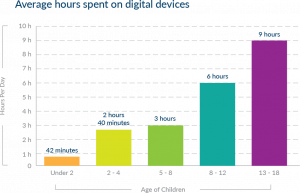Computer Glasses & Blue Light Protection
In today’s hi-tech world, using a computer and mobile phone is a necessity. With the global reach of business and private enterprise, the need for constant connectivity has made much of our lives more convenient and efficient. However, it has also caused some serious concerns among parents, educators, sociologists, and members of the medical community.
The average American child has up to 4 hours of screen time every day. For adults, it’s almost triple that number. According to studies, American adults spend up to 11 hours each day on various types of interactive media. This heavy amount of screen time is, not surprisingly, resulting in significant health issues, especially on the eyes. The most common condition is Digital Eye Strain, also referred to as Computer Vision Syndrome.
Nutritional Intervention
Nutrition builds up our eyes’ natural protection against free radicals, but how many adults eat the right amount of leafy green and brightly colored veggies, let alone children? While nutrition isn’t top of mind for a child, it is for the parent. I make a point of explaining to parents that starting children out early on a healthy diet is more likely to keep them eating well throughout their lives. Even with a proper diet, though, the eyes tend not to get the nutrients they need to sustain natural protection. Giving parents a simple way to help naturally defend their children’s eyes from the ill effects of screen time is a great way to make an impact on this tech-heavy generation.
Prescribing high-quality nutraceuticals is an easy way to supplement a child’s diet with the protective nutrients they need. Quality and purity are key when it comes to choosing a product to provide your pediatric patients. Finding a product backed with clinical research and high-quality ingredients makes the most sense. I encourage my fellow eye care professionals to do their research and find what works best for their practice.

Reducing Screen Time
Because tech companies are aware of the danger of too much screen time, many smartphones now include built-in triggers to warn users when their screen time has gone over a certain number of hours. This is done to raise awareness and reduce excessive use.
In addition to computer glasses and ergonomic devices, doctors advise people to take frequent breaks while using digital devices. Walk around, stretch, go outside, and find other activities to do in between computer use. This, combined with visual aids, can help improve or even prevent DES and CVS from developing.

